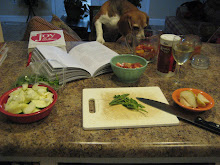My husband came home the other day from an oil change with a ripped recipe from Bon Appetit magazine (apparently our neighborhood car maintenance place has a love of gourmet cooking). This was the recipe:
http://www.bonappetit.com/recipes/quick-recipes/2009/12/chicken_with_roasted_grapes_and_shallot
Roast chicken is one of those things where, the more you fix it, the more you develop a kind of sixth sense for timing it so it's perfectly done and juicy. You also develop a sense of how much seasoning to use. For this recipe, using a whole chicken as recommended is really the best way to go. If you're squeamish about dealing with a whole chicken, well, the most I can say is to just get over it and go for it. If you can find a chicken with its giblets neatly tied in a bag for easy removal, go for that. But if you can deal with it, I've actually found a chicken with its giblets still loose but easily removable by hand tastes better and has a tendency to produce a tastier roast. No matter your choice, remove the giblets and give the chicken a quick rinse under cold water, including a rinse of the cavity (that big gaping hole near the chicken legs, in case you're not familiar with the anatomy of a chicken). Make sure you dry the chicken well, blotting all over with paper towels (yes, even in the cavity). This recipe gives a vague direction to rub the chicken with a tablespoon of olive oil, which you'll want to do, but go an extra step and lift the skin around the breast area and rub some oil under there as well--it makes an extra crispy skin later on. Just try not to tear the skin covering the breast meat--you'll want to loosen it where it naturally pulls away from the neck area and go from there. Remember to season liberally--chicken is naturally a little bland, but it's amazing what the right amount of salt and pepper can do for the taste, plus that salt will lock in the juices in the chicken, an integral part of roasting.

(This was prior to roasting--I loved the bright colors of the grapes.)
I followed the timing on the recipe, and it was the perfect length of roasting time (one hour and 10 minutes). If you don't have one, invest in a good meat thermometer to avoid the unpleasantness of having to cut into a perfectly roasted chicken to make sure it's done. I say unpleasant, because doing so will just deplete the chicken of all of those extra juices, and nothing is more unappetizing than a dry chicken. It's essential to let the chicken rest for those 10 minutes as listed in the recipe--the chicken will continue cooking those few extra minutes, and the juices will be perfection once you cut into the meat. If you're not sure how to properly carve a chicken, there are myriad videos available to show you how. But the best resource I've found is in the first volume of "Mastering the Art of French Cooking" by (of course) Julia Child. Whatever method you settle upon, however, it's important you have a very sharp knife in order to efficiently cut through the bones.
About 30 minutes into the chicken cooking time, I started the mashed potatoes. I've never really made mashed potatoes a staple in the house, because they tend to end up dry, under-seasoned and underwhelming. But I thought I would give it another shot anyway. I started with some salted boiling water in a large saucepan. I added into the boiling water six Yukon gold potatoes cut into 1" cubes, adding additional salt. I highly recommend Yukon gold potatoes because they have a very buttery consistency. You can use new potatoes or russet if you have those on hand, but I don't think the taste yields the same result. I rapidly boiled the potatoes for about 30 minutes, or until a fork inserted into a cube literally tore the cube apart. I drained and put them into a large bowl, seasoned more with salt and pepper to taste, and used a masher to, obviously, mash the potatoes. I left the skin on the potatoes because I think the texture is better, but it's your call. I mashed to a very smooth consistency, then added just about every dairy product I could find in our refrigerator. That meant some buttermilk, a few dollops of sour cream, regular milk, Gruyere cheese, and (I think this was the key) the bechamel sauce leftover from last night's meal. I also added some chopped chives. The result? I think my husband said it all when he took one bite and his eyes rolled into the back of his head. He called them the "best mashed potatoes he's ever had."
And I kind of totally agree.

The result of tonight's work:



No comments:
Post a Comment